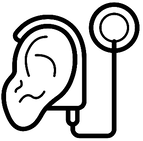Impressions of Cochlear Implant User Speech10/15/2023 How do intelligibility and speech quality affect what people think of CI users (especially when listeners don't know about their deafness)? This project examines the first impressions listeners make about deaf cochlear implant users' after hearing their voices for the first time. Cochlear implants (CI) provide sound to deaf recipients, but they don't transmit all the auditory information in the speech signal. As young CI users grow up learning to understand and use speech, they may be hard to understand or their voices may not sound quite typical. In one experiment, college students gave their first impressions about the personalities of young adult CI users and controls with typical hearing (TH) after hearing them read a few sentences. TH speakers were rated most positively, followed by highly-intelligible CI users, and then less-intelligible CI users, showing that intelligibility matters, but listeners can also perceive something different about CI users' voices, even when every word is intelligible. A second experiment found the same patterns, but listeners with more positive attitudes toward deafness rated the less-intelligible CI users more positively than listeners with negative attitudes rated them, suggesting that education about deafness and/or experience with deaf people could improve peers' judgments. In a third experiment, hiring managers imagined the speakers were job applicants; they showed the same rating patterns, with those in white-collar and high-communication jobs rating highly-intelligible CI users more negatively than did managers for blue-collar or low-communication jobs, suggesting an unconscious bias or lack of knowledge that could affect CI users' employment options. Other experiments explore the acoustic features in CI users' samples that listeners identify as different from TH voices. See news and updates related to this and other cochlear implant projects. Funding, Papers & Presentations
Funding:
People & Related Work
Collaborators:
Related work:
Student Corner
Data and materials:
Comments are closed.
|

